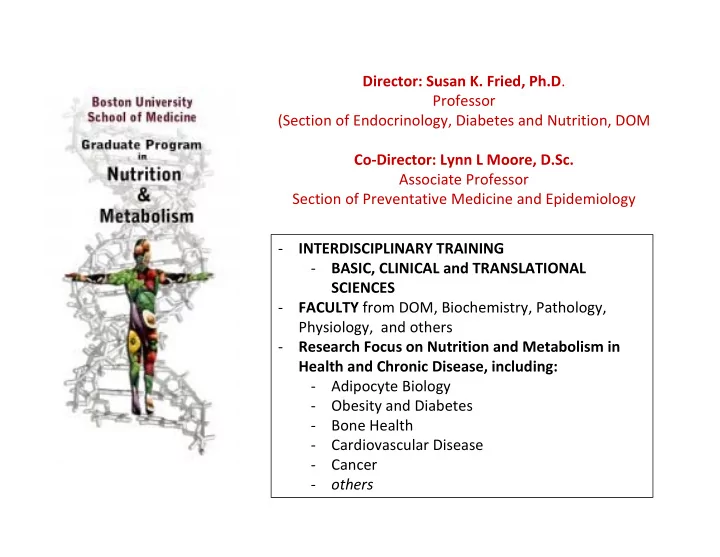

Director: Susan K. Fried, Ph.D . Professor (Section of Endocrinology, Diabetes and Nutrition, DOM Co ‐ Director: Lynn L Moore, D.Sc. Associate Professor Section of Preventative Medicine and Epidemiology ‐ INTERDISCIPLINARY TRAINING ‐ BASIC, CLINICAL and TRANSLATIONAL SCIENCES ‐ FACULTY from DOM, Biochemistry, Pathology, Physiology, and others ‐ Research Focus on Nutrition and Metabolism in Health and Chronic Disease, including: ‐ Adipocyte Biology ‐ Obesity and Diabetes ‐ Bone Health ‐ Cardiovascular Disease ‐ Cancer ‐ others
What is ‘Nutrition and Metabolism’? • All aspects of an organisms interaction of food/nutrients • Beyond classic ‘deficiency’ to prevention of chronic disease • Molecular, Biochemical, Physiologic, Organismic, and Population levels (i.e. basic, clinical, translational levels) Topics include: ‐ Mechanisms regulating cellular nutrient transport ‐ Cellular mechanisms of lipotoxicity and glucotoxicity ‐ Nutrient and hormonal regulation of adipokine production ‐ Nutritional influences on developmental programing ‐ Consequences of dietary protein level on blood pressure ‐ Fat distribution and risk for cancer other other chronic disease
The Nutrition and Metabolism PhD Program participates in the GMS Program in Biomedical Sciences (PiBS) Required: Foundations in Biomedical Sciences Curriculum (FiBS)
Nutrition and Metaoblism PROGRAM ‐ SPECIFIC COURSEWORK: ‐ Foundations of Biomedical Science Curriculum ‐ Biochemistry, genetics, cell biology, cell communication, molecular metabolism ‐ Research Rotations (3) ‐ Nutrition and Metabolism specific courses ‐ (required of all students regardless of whether they focus on Epidemiological or basic aspects of nutrition for their thesis work and advanced courses) ‐ Molecular, Biochemical and Physiological Bases of Nutrition: I and II ‐ (Energy and micronutrient metabolism (4); Macronutrient Metabolism(4) ‐ Clinical Nutrition Research ‐ Nutrition Seminar ‐ Biostatistics ‐ Epidemiology ‐ Advanced Electives (depending on interests) – at least 36 course credits for those that enter with a Bachelor’s degree) plus research
The Nutrition and Metabolism Graduate Program Master’s Program A MASTER’S degree in Nutrition and Metabolism provides students with a broad background in nutrition and metabolism, from molecule to population. � Can be completed in one calendar year � Required courses: Biochemistry (if not previously taken) • Molecular, Biochemical and Physiological Bases of Nutrition (4,4) • Clinical Nutrition Research (3) • Epidemiology (3 ‐ 4) • Biostatistics (3+) • Nutrition Seminar • Electives • Total 28 course credits, 4 research credits • � Research thesis under direction of a faculty member (defended) � Prepares students for: Medical , dental or other pre ‐ professional studies • Further graduate work • Jobs in study/clinical coordinators • Careers as lab managers, data analysts, research assistants in academic or • biotech/pharma settings
Recommend
More recommend